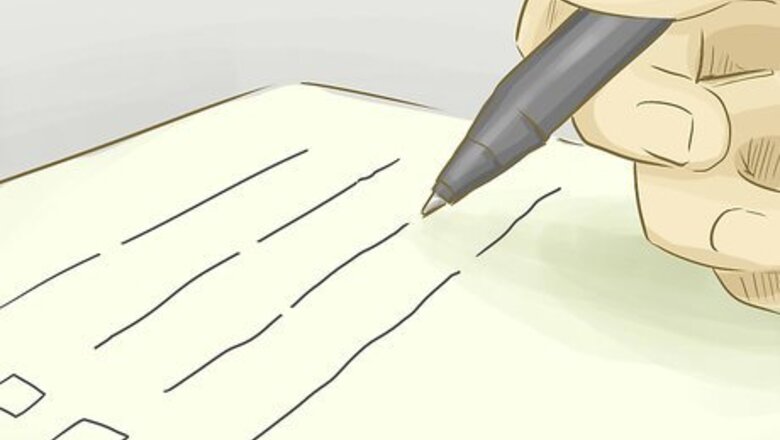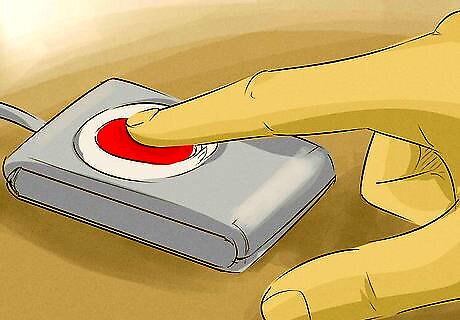
views
X
Research source
Requesting State Criminal Records

Make a list of past residences. If you've lived in more than one state, you'll need to get your criminal record from each one to find out if you have a felony. A list of past residences can help you determine which states you need to contact. It may be difficult to remember the exact street address where you lived in a state long ago. Typically, however, you won't need the exact street address – you just need to know the city and state. Even if you've lived in several parts of the same state, make a list of the counties where you lived. Typically you'll only need one state criminal record, but you may need to identify specific jurisdictions.

Contact the appropriate state agency. Different law enforcement agencies are responsible for handling criminal records requests depending on the state. To find the correct agency, you can do an internet search for "criminal record request" with the name of your state. You also can find out which agency to contact by calling your local police department and asking. Make sure you call the non-emergency number. When you get in touch with the correct agency, ask what you need to do to get a copy of your own criminal record. Although this record is restricted for privacy reasons, you always have the right to get a copy of your own record.

Complete a request form. Most states have a basic form you must fill out to get a copy of your criminal record. Often you can download this form online, but you may have to go to a law enforcement office to pick one up. You also can get your state's law enforcement or criminal records agency to mail you a paper copy. However, keep in mind this will mean you'll have to wait a few days, if not longer, to start the process of getting a copy of your criminal record. The form typically requires basic identification information, including your full legal name and birth date. You also must provide a complete mailing address. Make sure this information is correct, since this is the address the state will use to send you a copy of your criminal record. You may have to explain the reason you need a copy of your criminal record. Keep in mind that regardless of your answer, you always have the right to see your criminal record.

Get fingerprinted. In almost all states, you have to submit fingerprints when you request your criminal record. Your fingerprints help to verify your identity to the state law enforcement agency that processes your request. Typically you can get fingerprinted at your local police precinct. The form you fill out to request a copy of your criminal record will provide details on where and how to get your fingerprints. Some states contract with private companies to get fingerprints made for these purposes, meaning you can't just go down to the local police station to get them done. Keep in mind that you'll have to pay a fee to get your fingerprints taken, typically between $30 and $50.

Submit your request. Once you have your form and fingerprints complete, you typically must mail them to the state bureau of investigation along with a fee. Your request will be processed and you'll receive a copy of your report in the mail. The form should have an address where your request should be mailed, along with information on any processing fee required and the methods of payment accepted. The fee to get a copy of your criminal record typically is between $10 and $20, depending on the state. In most states, you can expect to get a copy of your criminal record in the mail within two weeks to a month after you mail your request, provided all the information is complete and correct.
Checking Federal Records

Get the appropriate form. The FBI has an "applicant information form" that you must complete and submit to them if you want a copy of your federal criminal record – known to federal law enforcement as an identity history summary. This is the form you'll fill out if you are submitting your request directly to the FBI. However, in some circumstances you'll need to go through a state agency to get your federal criminal record, rather than contacting the FBI directly. If you're just seeking a copy to conduct a personal review and find out if you have a felony, you can submit the applicant information form directly to the FBI. The FBI does not respond to requests that are related to the purposes of licensing and employment. For those reasons, you'll need to go through a state agency. You can request the applicant information form from the FBI website, or by contacting an FBI field office near you.

Complete your applicant information form. The application information form is fairly straightforward, requiring basic personal identification and contact information for you. The form also may require you to provide the reason you're seeking your identity history summary. Make sure you provide a correct and complete mailing address. This is the address to which your identity history summary will be mailed. If you have a phone number and email address, you also should include these on your form. This may decrease delay if the FBI agent who reviews your request has to contact you or ask additional questions about your request. You have the option of either typing the form or filling it out by hand. If you're hand-writing your answers, use blue or black ink.

Get a set of fingerprints. The FBI requires you to get a full set of fingerprints using the standard FBI fingerprint form, Form FD-258. You can download this form from the FBI's website and print it at home using standard white paper. You must send a current fingerprint card. If you got your fingerprints taken because you requested your state criminal record, you'll have to get them done again. Contact a law enforcement agency near you to find out where you can get your fingerprints taken. Keep in mind you'll probably have to pay a fee of between $20 and $50 for this service. Make sure the fingerprints you get are both "rolled impressions" and "flat impressions." This means you technically need two sets. Rolled impressions involve rolling each finger individually. Flat impressions capture all ten fingers at once. The fingerprint technician who takes your fingerprints will understand what you need, but make sure you get both.

Submit your request. Once you have your form and fingerprints, you must mail them to the FBI using U.S. First Class Mail. You must include a payment of $18 for each response. If you need an additional sealed response mailed to an address other than the one you provided on your application information form, you must include another $18. You can download a credit card form from the FBI website if you want to pay using a credit or debit card. Otherwise, you must pay using a certified check or money order made out to the Treasury of the United States. The FBI does not accept cash, personal, or business checks. If you use the wrong method of payment or send payment for the wrong amount, your request will be delayed. You can mail your documents and payment to FBI CJIS Division – Summary Request, 1000 Custer Hollow Road, Clarksburg, WV 26306.

Receive your identity history summary report. Once your request is processed, the FBI will send the results to the mailing address you provided on your applicant information form, using U.S. First Class mail. Keep in mind that it may take three or four months to get your report in the mail, so plan accordingly. If you have no federal criminal record, you will get a statement back that states that no record exists.
Correcting Errors in Your Record

Search for forms. Your state may have a form that you can fill out to report an error in your criminal record. Find out by contacting your state bureau of investigation or other criminal records office. You may be able to find a form online that you can download. Search for "criminal history error resolution" with the name of your state. Typically you also can get one of these forms from a state police office. If the error correction form is available somewhere else, a state police officer will let you know. When you get the form you need, read over it carefully so you'll know what kind of information you need to submit to get the error corrected.

Gather supporting evidence. If you see something on your criminal record that you believe is an error, the state will require proof that the information in your criminal record is incorrect. Your personal testimony typically is not enough. The type of evidence you'll need depends on the error on your report. For example, if your identity has been mixed up with someone else, and entries from their criminal history are showing up on your criminal record, personal identity documentation may be all you need. However, if you were convicted of a misdemeanor that has been reported on your criminal record as a felony, you typically need a certified copy of the original court order. To get a certified copy, you must make a trip to the clerk's office of the court that entered the order convicting you. In some circumstances, the problem with your criminal record may be a mere clerical error. You still must provide some kind of documentation or evidence of what the record actually should be.

Consult an attorney. If you're having difficulty finding evidence to support your claim that your criminal record is incorrect, an attorney may be able to assist you. For this sort of thing, you may be able to get free help from your local legal aid office. A criminal defense attorney typically is the type of attorney you need to find. They usually give free initial consultations, so you won't really lose anything to schedule a consultation and ask your questions. Particularly if you've found an error on your federal criminal record, an attorney may be necessary to help you navigate the procedures. Since the FBI gets its information from state authorities, the error may exist in more than one place. If all you need is help getting the error on your criminal record corrected, an attorney typically will help you with that for a relatively low flat fee.

Submit your information. Once you have everything your state requires, gather it along with any fee and send it to the appropriate office for review. Typically you can mail it, but in some states you may have to go to a law enforcement or criminal records office in person. Make sure you have all the forms and documents you need. Any court documents you submit typically must be certified copies, which will cost you probably $10 or $20 to get. Most states charge a processing fee for error correction requests – usually less than $20. If you aren't able to pay the fee, you may be able to have it waived in some states. Ask at the office where you got your error correction form. Make a copy of everything you send for your own records before you send them, and make note of the date you mailed the documents. You may need this information later if there's a problem processing your request.

Verify the error has been corrected. It may take a number of weeks before your request is processed and the error is corrected. In the meantime, a government official may contact you if they need further information. Typically you'll get a notice from the state letting you know that the error has been corrected. However, you may want to order another copy of your criminal record to confirm that the changes have been made and no other errors have been introduced. Talk to someone in the office that handled your request to find out if there's any way you can get another copy of your criminal record free of charge so you can verify that the change was made. Once an error is changed in one place, you may have to take additional steps to get it changed elsewhere. Unfortunately, until you check those other criminal records there's no way to know for sure. However, an agent in the office that handled your request may be able to tell you whether the change will be reflected on other criminal records.















Comments
0 comment